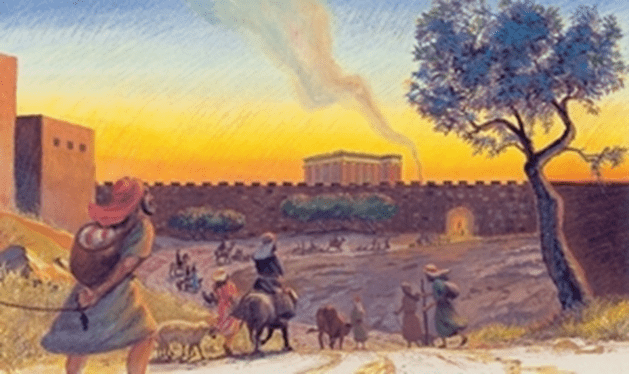God’s Prophetic Calendar
“The Seven Feasts of Israel”
Leviticus 23:1-44
Wayne J. Edwards, Pastor
From the beginning, God the Father’s desire was to have a personal, intimate relationship with those He created. He also took the initiative in developing that relationship by establishing seven annual “appointed times” for His people to stop their work and worship Him.
- God arranged these annual feasts to remind His people of His ways, His will, and His promise of a Messiah, a Savior.
- God also designed these annual events to reveal His plan of redemption, to establish His kingdom on the earth, and to dwell among those He had redeemed forever.
- According to Leviticus 23:4, God instructed Moses to make it clear that these were not Jewish feasts, but feasts unto the Lord.
- By not consistently teaching about The Seven Feasts of Israel, their historical background, as well as in their prophetic context, and their prophetic context, the church failed to teach a very significant part of the heritage of our Christian Faith, especially how its roots are firmly planted in Judaism.
In Colossians 2:16-17, Paul said Christians are not “required” to celebrate the Jewish Feasts, for they were, or will be fulfilled in Jesus Christ!
- However, in Romans 15:4, Paul said those things that were written before our time were written for our learning, so that we could understand the future.
- The church should follow the pattern of these seven feasts as a tool to teach children how those seven feasts have been, are being, and will be fulfilled in and through the Person and work of Christ.
- These seven feasts provide the key to our understanding of God’s purpose for humanity and His plan for our future.

The Spring Feasts – The Suffering Savior
The Feast of Passover – Leviticus 23:4.
- Commemorated the provision God made for the Israelites when the angel of death struck all the firstborn in Egypt but passed over the Israelite houses that were marked with the blood of the lamb.
- Fulfilled in the crucifixion of Jesus Christ as the Lamb of God who takes away the sins of the world. God’s judgment of eternal death will not affect those who are covered under the blood of Jesus Christ.
The Feast of Unleavened Bread – Leviticus 23:6-8.
- Commemorated the night God told the Jews not to use any “leaven” in their bread, for they would not have time for it to rise before they left Egypt. Leaven is symbolic of “sin”!
- Fulfilled as the sinless Lamb of God was buried in the tomb to rise again in three days.
The Feast of Firstfruits – Leviticus 23:9-14.
- Commemorated the beginning of the spring barley harvest.
- It was fulfilled when Jesus rose from the grave, the “firstfruits of those who are asleep!” (1 Cor. 15:20)
The Feast of Pentecost – Leviticus 23:15-21.
- Marked the end of the spring harvest – observed by offering two loaves of “leavened” bread unto the Lord.
- Fulfilled 50 days after the ascension of Jesus Christ; the Holy Spirit came and baptized “two sinful loaves” – Jews and Gentiles, into one body; the Church.

The Fall Feasts
The Feast of Trumpets – Leviticus 23:23-25.
- Marked the end of the summer harvest with the blowing of the “shofar” (trumpets) a hundred times, with the “last trumpet” a long, extended blast.
- Will be fulfilled on the day of the Rapture of all of those who received Jesus Christ as their Savior during the Church age, which began on the day of Pentecost.
The Day of Atonement – Leviticus 23:26-32.
- Commemorating a “day of solemnity,” – Israelites afflicted their souls for their own sins, and the sin of their nation, a goat was sacrificed and its blood poured out upon the altar, and a second goat was held by the priest and then driven into the wilderness to “take their sins away!”
- Will be fulfilled at the end of the Tribulation when the Jews stand in awe at God’s grace and they receive Jesus as their Messiah: The One whom God sent to atone for their sins.
The Feast of Tabernacles – Leviticus 23:33-44.
- Commemorating the 40 years their forefathers dwelt in tents in the wilderness.
- This will be partially fulfilled when the Jews who are saved during the Tribulation live in the Promised Land with the Lord Jesus for 1,000 years. Zechariah 14:16, Amos 9:11, Isaiah 65:17-20, 2:2-4, 11:11-12, 27:12-13.
- Will be finally fulfilled in eternity as the “tabernacle of God is among men, and He will dwell with them, and they shall be His people!” – Revelation 21:3-54.
The seven feasts are bound together by “the Sabbath,” – which means to “cease work” or to “rest from one’s labor”!
- When we receive Jesus Christ as our Savior, we can rest from our labor of trying to earn our acceptance with God. This “Sabbath rest” will last for all eternity.
- The Apostle’s instructions reveal God’s intentions that all Christians observe His Holy Days, and for a remarkable reason – to show us where we are on His prophetic calendar.










